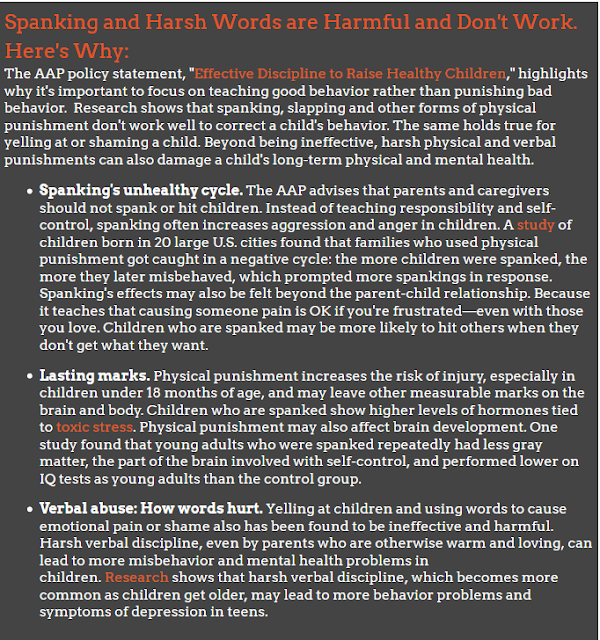Mistakes Parents Make
Did
you know that you may be your own worst enemy when it comes to parenting? Dr.
Hiam G. Ginott (2003) has labeled seven common parenting patterns as
self-defeating. Not only do these patterns fail to help us reach our end goals,
but they create chaos in our homes, and undesirable behavior in our children.
“These self-defeating patterns include threats, bribes, promises, sarcasm,
verbal overkill, sermons on lying and stealing, and rude teaching of politeness”
(Ginott, 2003, p. 59). Let’s discuss each pattern in more detail.
Threats
Have
you ever used the phrase, “if you do that one more time, I’m going to (fill in
the blank)” when trying to get your child to stop what he is doing? How’d that
work for you? If your child is anything like mine, they probably turned around
and did the exact thing you told them not to. You see, “to children, threats
are invitations to repeat a forbidden act” (Ginott, 2003 p. 59). Your child
failed to hear the “if you” all he heard was “do that one more time.” He
honestly thought you expected him to do it and he didn’t want to disappoint
you. “Your warning serve[d] as a challenge to [his] autonomy” (Ginott, 2003, p.
59) and he wasn’t about to let you damage his self-respect.
Instead
of threatening, “if you shoot your baby brother one more time, I’m going to take
the nerf gun away.” Simply say, “not at the baby. Shoot at the target” (Ginott,
2003, p. 59). If he shots again, take the gun away and reinforce that people
are not for shooting. This will teach him the consequences of his actions
without damaging his self-respect.
Ariadne
Brill (2015), a certified Positive Discipline Parenting Educator, offers three
effective ways to discipline without threats.
1. Be specific instead of using
unclear and angry words.
Sometimes
our children continue misbehaving because they don’t understand what we want
them to do. Instead of threatening discipline, explain why the behavior is
unacceptable.
2.
Remember cooperation happens when children feel capable and encouraged. Instead
of threatening, try offering alternatives that involve your child in the
process.
Instead
of saying “leave your sister alone or you’ll be sent to your room.” Say, “Do
you want to come over here and help me? Your sister would like to play alone
right now, but I would like your company!” (Brill, 2015)
3.
Use language that invites cooperation.
Instead
of saying, “Pick up your toys or else!” Say, “Let’s work together: I’ll put these
books on the shelf, would you like to put the blocks away or animals in the
drawer?” (Brill, 2015)
Bribes
According
to research, bribes do not affect behavior or motivate children in the long
run, they simply: “buy temporary compliance” (Dennis). Our goal in parenting
should not be “manipulated obedience,” it should be to help our child gain the
desire to be obedient (McDonald, 2019).
When
we bribe a child, we send a message that the behavior or activity is
unpleasant. After all, one must be rewarded to want to do it. The child then
views the reward as the benefit of doing an unpleasant task. This thinking robs
them of experiencing the natural reward of the activity. “Using bribes to manipulate kids to repeat a
desired behavior is a control tactic that makes kids focus on the reward rather
than helping them want to repeat the behavior” (Markham, 2017).
Instead
of bribing to buy results, try giving rewards when they are unexpected.
“Rewards are most helpful and more enjoyable when they are unannounced in
advance, when they come as a surprise, when they represent recognition and
appreciation” (Ginott, 2003, p. 60).
Promises
Our
relationship with our children should be built on trust, therefore “promises
should neither be made to, nor demanded of, children” (Ginott, 2003, p. 61).
According to Dr. Ginott, “promises build up unrealistic expectations in
children” (Ginott, 2003, p. 61). He (2003) gave the following example to
illustrate how unrealistic expectations cause grief for all involved. When you
promise your child a trip to the zoo, they consider it a commitment that the
trip will go off without a hitch. They expect the weather to be perfect, the
animals to be out in their exhibits, and that no one in the family will be
sick. As an adult, you realize that life isn’t perfect and trips don’t always
go according to plan. You may feel a little disappointment but that is nothing
in comparison to what your child feels. Your child feels betrayed and convinced
that you cannot be trusted. Resulting in the familiar cry of, “but you
promised!”
Sarcasm
“Bitter
sarcasm and cutting clichés have no place in child upbringing” (Ginott, 2003,
p. 62). When parents use sarcasm, they create barriers to effective
communication and learning and damage their child’s mental health.
Verbal
overkill
How
many times have you been told, “you talk like a parent”? This shouldn’t be
viewed as a compliment, what they are saying is stop talking. You’ve already
made your point and are just repeating yourself. I’ve stopped listening.
“Every
parent needs to learn economical methods of responding to children, so that
minor mishaps do not turn into major catastrophes” (Ginott, 2003, p. 62).
Dr.
Ginott offered the following example of how a sympathetic brief reply prevented
a futile argument:
Ruth
(age 8): Mommy, did you know that junior high school is the school of romance?
Mother:
Oh?
Ruth:
Yes, the boys and girls have parties all the time.
Mother:
So, you’re looking forward to junior high?
Ruth:
Oh, yes!
In
the past Ruth’s mother related that she would have lectured her daughter about wasting
her time; that school is for learning, not romancing; and that she was
altogether too young to think about such things. Long arguments and a spoiled
mood would have followed. Instead she acknowledged her daughter’s desire. (Ginott,
2003, p. 63)
Sermons
on lying
“Parents
are enraged when children lie, especially when the lie is obvious and the liar
is clumsy” (Ginott, 2003, p. 65).
According
to Dr. Ginott, “parents should not ask questions that are likely to cause defensive
lying” (2003, p. 65). Which means, do not ask questions when you already know
the answer. You will only be frustrated by the response.
Here
is an example that illustrates this principle and explains why it is so harmful:
Quentin,
age seven, broke a new truck given to him by his father. He became frightened and hid the broken
pieces in the basement. When his father
found the remains of the truck, he fired off a few questions that led to an
explosion.
Father:
Where is your new truck?
Quentin:
It’s somewhere.
Father:
I didn’t see you playing with it.
Quentin:
I don’t know where it is.
Father:
Find it. I want to see it.
Quentin:
Maybe someone stole the truck.
Father:
You are a damned liar! You broke the truck!
Don’t think you can get away with it. If there’s one thing I hate, it’s
a liar!
This
was an unnecessary battle. Instead of sneakingly playing detective and
prosecutor, and labeling his son a liar, his father would have been more
helpful to his son by stating, “I see your new truck is broken. It did not last
long. It’s a pity. You really enjoyed playing with it.” The child might have
learned some valuable lessons: Dad understands. I can tell him my troubles. I
must take better care of his gifts. I have to be more careful. (Ginott, 2003,
p. 66)
Have
you ever wondered why children lie? Dr. Ginott explains, “sometimes they lie
because they are not allowed to tell the truth” (2003, p. 67). He (2003) used
the following example to illustrate his theory:
Four-year-old
Willie stormed into the living room, angry, and complained to his mother: “I
hate Grandma!” His mother, horrified, answered, “No, you don’t. You love
Grandma! In this home we don’t hate. Besides, she gives you presents and takes
you places. How can you even say such a horrible thing?”
But
Willie insisted, “No, I hate her, I hate her. I don’t want to see her anymore.”
His mother, now really upset, decided to use a more drastic educational method.
She spanked Willie.
Willie,
not wanting to be punished more, changed his tune: “I really love Grandma,
Mommy,” he said. How did Mommy respond? She hugged and kissed Willie and
praised him for being such a good boy.
What
did little Willie learn from this exchange? It’s dangerous to tell the truth,
to share your true feelings with your mother. When you’re truthful, you get
punished; when you lie, you get love. Truth hurts. Stay away from it. Mommy
loves little liars. Mommy likes to hear only pleasant truths. Tell her only
what she wants to hear, not how you really feel.
What
could Willie’s mother have answered if she wanted to teach Willie to tell the
truth?
She
would have acknowledged his upset: “Oh, you no longer love Grandma. Would you
like to tell me what Grandma did that made you so angry?” He may have answered,
“She brought a present for the baby, not for me.” (p. 67)
“If
we want to teach honesty, then we must be prepared to listen to bitter truths
as well as pleasant truths” (Ginott, 2003, p. 68).
Sermons
on Stealing
“It
is not uncommon for young children to bring home things that do not belong to
them” (Ginott, 2003, p. 71). When you discover your child has stolen something,
“it is best to confront him unemotionally” (Ginott, 2003, p. 71). Resist the
urge for long lectures and dramatics. Steer clear of questions that may result
in defensive lying. Instead, state the facts and the information you know.
Rude
teaching of politeness
“Politeness
is both a character trait and a social skill; it is acquired through
identification with, and imitation of, parents who are themselves polite”
(Ginott, 2003, p. 72).
Parents
have a gift for teaching politeness in rude ways. We interrupt the interrupting
child to teach them to stop interrupting. We point out, in front of other
people, when they have forgotten to say thank you. We quickly remind them to
say goodbye, even if we have yet to do it ourselves.
“Parents
should not be rude in the process of enforcing child politeness” (Ginott, 2003,
p. 73). Telling a child, they are rude is not going to inspire them to be
polite. The only way to inspire polite behavior is to model it yourself.
References:
Brill, A. (2015, November 13). Why
Threats and Bribes Don’t Lead to Cooperation and What to
Try Instead. Retrieved December 14,
2019, from https://www.positiveparentingconnection.net/why-threats-and-bribes-dont-lead-to-cooperation-and-what-to-try-instead/.
Ginott, H. (2003). Self-defeating Patterns: There's No Right
Way to Do a Wrong Thing. In
Between
Parent and Child (pp. 58–75). Retrieved from: https://content.byui.edu/file/d8eb8fca-89c5-4432-a589-59a57e705539/1/Parent%20and%20Child_Combined.pdf
Markham, L. (2017, July 19). What's So Bad About Bribing
Your Child? Retrieved December
14,
2019, from https://www.psychologytoday.com/us/blog/peaceful-parents-happy-kids/201707/whats-so-bad-about-bribing-your-child.
McDonald, S. (2019). W05 Spiritual
Opener: Bribes. Unpublished Essay Response, Brigham
Young University - Idaho
Images:
Image
of Child Manners Retrieved December 14, 2019 from:
Image
of Child Stealing Retrieved December 14, 2019 from:
Image
of Child with Nerf Gun Retrieved December 14, 2019 from:
Image of Lying
Child Retrieved December 14, 2019 from:
Image
of Mother Bribing Child Retrieved December 14, 2019 from:
Image
of Mother Lecturing Daughter Retrieved December 14, 2019 from:








Comments
Post a Comment